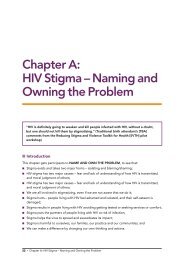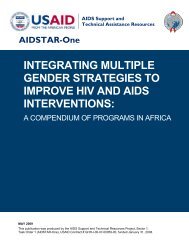Guide for Community Assessments on Women's Health Care - ICRW
Guide for Community Assessments on Women's Health Care - ICRW
Guide for Community Assessments on Women's Health Care - ICRW
You also want an ePaper? Increase the reach of your titles
YUMPU automatically turns print PDFs into web optimized ePapers that Google loves.
Step 2: Set Objectives<br />
Develop clear objectives that define:<br />
●●<br />
●●<br />
●●<br />
●●<br />
What in<str<strong>on</strong>g>for</str<strong>on</strong>g>mati<strong>on</strong> you want to collect;<br />
What you want to do with the in<str<strong>on</strong>g>for</str<strong>on</strong>g>mati<strong>on</strong> and analysis produced in the workshops;<br />
What <str<strong>on</strong>g>for</str<strong>on</strong>g>ms of acti<strong>on</strong> you would like to stimulate at the community level; and<br />
What impact you would like to create with the MP co-facilitators.<br />
Sample Objectives<br />
●●<br />
●●<br />
●●<br />
●●<br />
Document women’s c<strong>on</strong>cerns about their health problems and health services;<br />
Identify obstacles to women’s effective use of health services;<br />
Help MPs acquire firsthand in<str<strong>on</strong>g>for</str<strong>on</strong>g>mati<strong>on</strong> about women’s health problems through direct<br />
c<strong>on</strong>tact with HIV-positive women and other women at the community level; and<br />
Start the process of building dialogue am<strong>on</strong>g HIV-positive women, parliamentarians and<br />
civil society organizati<strong>on</strong>s.<br />
Step 3: Prepare a Checklist of Key Questi<strong>on</strong>s<br />
Once the objectives have been set, prepare a checklist of key questi<strong>on</strong>s that will help keep you<br />
focused <strong>on</strong> the issues to be explored and the in<str<strong>on</strong>g>for</str<strong>on</strong>g>mati<strong>on</strong> to be collected in the workshop sessi<strong>on</strong>s.<br />
One example of a checklist is given below.<br />
Key Questi<strong>on</strong>s<br />
1. What do different stakeholder groups understand by the term “women’s health”? What<br />
are their attitudes toward women’s health and HIV-positive women’s health?<br />
2. What health issues do different stakeholders perceive to have the biggest impact <strong>on</strong><br />
women in general, and women living with HIV in particular? What are some cultural<br />
practices (e.g., female genital cutting, polygamy, wife inheritance) and social and<br />
envir<strong>on</strong>mental factors (e.g., HIV-related stigma and discriminati<strong>on</strong>; high incidence of<br />
gender-based violence, sexual crime, polluti<strong>on</strong>) that have a negative impact <strong>on</strong> women’s<br />
health?<br />
3. What health services (e.g., care and support <str<strong>on</strong>g>for</str<strong>on</strong>g> women with HIV and AIDS or other l<strong>on</strong>gterm,<br />
chr<strong>on</strong>ic or life-threatening c<strong>on</strong>diti<strong>on</strong>s) currently exist?<br />
4. What are the gaps in health services, including reproductive health?<br />
5. What are women’s experiences of using these health services? Are HIV-positive women’s<br />
experiences significantly different from the experiences of other women?<br />
6. What barriers prevent women from using these services? Are they different <str<strong>on</strong>g>for</str<strong>on</strong>g> HIVpositive<br />
women and other women?<br />
7. Which women’s health issues need priority resp<strong>on</strong>ses and what kinds of resp<strong>on</strong>ses might<br />
be appropriate? How can MPs, civil society organizati<strong>on</strong>s and others raise these issues in<br />
parliament and other <str<strong>on</strong>g>for</str<strong>on</strong>g>a?<br />
18 Chapter B: Planning and Preparati<strong>on</strong>

















